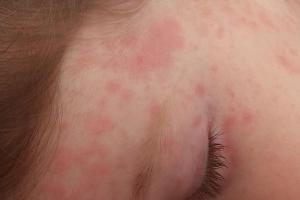Roseola
Roseola is a common viral infection that usually affects babies and toddlers. It typically causes a fever and a spotty rash for a few days. Roseola tends to be mild and you can normally look after your child at home. They'll usually recover within a week.
Symptoms of roseola
Roseola can also affect older children and adults. This is uncommon because most children will have been infected by the time they start nursery and it's rare to get it more than once.
Roseola doesn't always cause noticeable symptoms. If they do develop, they'll usually start a week or two after becoming infected.
Fever
At first, your child may have:
- a sudden high temperature (fever) of 38°C (100.4°F) or above – how to take your child's temperature
- a sore throat
- a runny nose
- a cough
- mild diarrhoea
- loss of appetite
- swollen eyelids and swollen glands in their neck
These symptoms typically last three to five days, at which point a rash often appears.
Some children also have fits (seizures) known as febrile seizures. These can be frightening, but are usually harmless.
Rash
The roseola rash usually appears once the fever has gone down.

The rash:
- is made up of pinkish-red spots, patches or bumps – these should fade if you roll a glass over them
- tends to start on the chest, tummy and back, before spreading to the face, neck and arms
- isn't usually itchy or uncomfortable
- normally fades and disappears within two days
It can be difficult to tell the rash apart from similar childhood infections, such as measles, rubella or scarlet fever.
How to treat roseola at home
You can usually look after your child at home until they're feeling better.
Let your child rest if they feel unwell. They may be more comfortable if they stay in bed until they're better, but there's no need to force them to rest if they seem well enough.
Keep them hydrated by giving them plenty of water or squash to drink.
If you're breastfeeding or bottle feeding your baby, keep feeding them regularly.
Keep them cool if their room is warm, for example, use a lightweight sheet on their bed, rather than a heavy duvet.
Give them children's paracetamol or ibuprofen if their fever is making them uncomfortable. Always read the leaflet that comes with the medication to find the right dose.
Don't give your child paracetamol and ibuprofen at the same time. If one doesn't work, you may want to try the other one later.
Never give aspirin to children under 16 unless advised to by a doctor.
When to call your GP
Most children recover within a week, so there's usually no need to see a GP.
But call your GP if:
- you're concerned about your child's symptoms
- you're not sure what's causing their symptoms
- your child is under three months old and has a temperature of 38°C (101°F) or above
- your child is between three and six months old and has a temperature of 39°C (102°F) or above
- the rash doesn't improve after three days
Also speak to your GP if you have a weakened immune system – for example, because you're having chemotherapy – and you've had contact with a child with roseola.
When to get emergency help
Call 999 for an ambulance or go to your nearest emergency department immediately if your child:
- has a rash that doesn't fade when you roll a glass over it – this could be a sign of meningitis
- has a seizure for the first time, even if they seem to recover
- has a seizure that lasts more than five minutes
- seems confused, drowsy or disorientated
- loses consciousness
Roseola doesn't usually cause any serious problems. But it's important to look out for these symptoms and get help if they occur.
How to stop roseola spreading
Roseola is spread in a similar way to the common cold – through coughs and sneezes, and contaminated objects or surfaces.
It doesn't spread very easily. You don't need to keep your child away from nursery or school if they're feeling well enough to go.
If they're unwell, keep them at home until they feel better. Although there's no need to wait until the last spot disappears.
The following may help stop the infection spreading to others:
- make sure you and your child wash your hands often
- make sure your child sneezes and coughs into tissues – throw away used tissues immediately and wash your hands
- clean surfaces regularly
- don't share cups, plates, cutlery and kitchen utensils
It's unclear exactly how long a child with roseola is contagious. They may be able to pass on the infection the whole time they're ill, including before the rash develops.
More useful links
The information on this page has been adapted from original content from the NHS website.
For further information see terms and conditions.